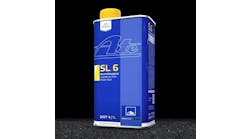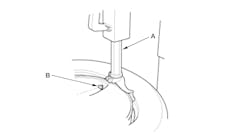Formanek is regional sales manager of Stellar Industries Inc. in Garner, Iowa, which manufactures tire service trucks and equipment for the commercial sector of the tire industry. He has been with Stellar for 23 years. Prior to that he spent six years at Collins Equipment, where he was a division manager before Stellar’s acquisition of the company.
He became involved with association work in 1991, when he was elected to a seat on the board of the National Tire Dealers and Retreaders Association (NTDRA). He has held numerous positions with the NTDRA, and then the Tire Industry Association (TANA) – both former names for TIA, including NTDRA supplier group chairman (1997), TIA treasurer (2008 – 2014), TIA secretary (2015), and TIA vice president (2016).
TIA currently has more than 8,000 members, of which approximately 77% are tire dealers. Asked about plans for leading this group, Formanek says, “TIA is a strong association. I plan to keep the course.
“I feel it is not one person’s right to bring their personal wants and wishes into this one-year position. I am here to represent the whole association and to make decisions which are in the best interest of the association.”
As he takes the wheel from Glen Nicholson, senior director of retail training for TBC. Corp., we asked Formanek for TIA’s stance on important legislative issues.
New OSHA requirement concerning work-related injuries and illnesses
The new rule, which takes effect Jan. 1, 2017, requires certain employers to electronically submit injury and illness data that they are already required to record on their on-site Occupational Safety and Health Administration (OSHA) Injury and Illness forms. Analysis of this data will enable OSHA to use its enforcement and compliance assistance resources more efficiently.
Some of the data will also be posted to the OSHA website. OSHA believes that public disclosure will encourage employers to improve workplace safety and provide valuable information to workers, job seekers, customers, researchers, and the general public. The amount of data submitted will vary depending on the size of company. The new reporting requirements will be phased in over two years:
- Establishments with 250 or more employees in industries covered by the record keeping regulation must submit information from their 2016 Form 300A by July 1, 2017. These same employers will be required to submit information from all 2017 forms (300A, 300, and 301) by July 1, 2018. Beginning in 2019 and every year thereafter, the information must be submitted by March 2.
- Establishments with 20 to 249 employees in certain high-risk industries must submit information from their 2016 Form 300A by July 1, 2017, and their 2017 Form 300A by July 1, 2018. Beginning in 2019 and every year thereafter, the information must be submitted by March 2.
The new OSHA rule issued to improve tracking of workplace injuries and illnesses includes a provision that prohibits employers from discouraging workers from reporting an injury or illness. The final rule requires employers to inform employees of their right to report work-related injuries and illnesses free from retaliation; clarifies the existing implicit requirement that an employer’s procedure for reporting work-related injuries and illnesses must be reasonable and not deter or discourage employees from reporting; and incorporates the existing statutory prohibition on retaliating against employees for reporting work-related injuries or illnesses.
These provisions became effective Aug. 10, 2016, but OSHA delayed their enforcement until Nov. 1, 2016, in order to provide outreach to the regulated community.
Small Business Healthcare Relief Act
The purpose of the bill is to address the fact that, under current law, employers who do not sponsor a group health plan but that reimburse their employees for their premiums for individual health coverage are violating the Patient Protection and Affordable Care Act (ACA) and are running the risk of being liable for an excise tax of $100 per day per reimbursed employee (or $36,500 per employee per year).
You read that right – up to $36,500 of penalties per year per employee for doing something nice for their employees!
The bill is now awaiting action in the Senate (as S. 3060) where it has been assigned to the Senate Finance Committee. The bill currently has the following cosponsors (in alphabetical order): Senators Michael Bennet (D-CO), Christopher Coons (D-DE), Corey Gardner (R-CO), Heidi Heitkamp (D-ND), Johnny Isakson (R-GA), Ron Johnson (R-WI), Rob Portman (R-OH), Lisa Murkowski (R-AK), Pat Roberts (R-KS), Jon Tester (D-MT), David Vitter (R-LA) and Mark Warner (D-VA).
In this era of Congressional stagnation, we are very pleased to see this small business friendly bipartisan bill moving forward. TIA will continue its efforts to help get this important bill over the finish line so that small businesses can continue to help their employees by reimbursing some or all of their premiums for individual insurance on a pre-tax basis.
Affordable Care Act and the Cadillac tax
Full repeal of the Adorable Care Act seems less than likely, therefore TIA has been supporting a variety of bills aimed at improving the act or delaying parts of its implementation. Last year, we were part of an effort that successfully delayed the Cadillac Tax on businesses for two years.
TIA is a member of the Small Business Coalition for Affordable Healthcare. This coalition represents the country’s largest, oldest and most respected small business associations who have spent more than a decade working to improve access and affordability of private health insurance.
TIA supports the bill the coalition has introduced known as the “American Job Protection Act” (S. 305). This bill repeals provisions of the Internal Revenue Code, as added by the Patient Protection and Affordable Care Act, that: (1) impose fines on large employers (employers with 50 or more full-time employees) who fail to offer their full-time employees the opportunity to enroll in minimum essential health insurance coverage, and (2) require large employers to file a report with the Department of the Treasury on health insurance coverage provided to their full-time employees. (This applies the Internal Revenue Code as if those provisions had never been enacted.)
These requirements will force employers to use their resources and savings to pay these penalties, at the expense of hiring employees, creating jobs and expanding their business. It also establishes a powerful disincentive to hire more than 50 employees. This cycle causes the employers to struggle with the cost of the penalty, and employees to suffer with lower wages and possibly job loss.
TIA also supports the “Save American Workers Act of 2015” (H.R. 30) which passed the house in 2015 on a 252-172 vote. This bill amends the Internal Revenue Code to change the definition of “full-time employee” for purposes of the employer mandate to provide minimum essential health care coverage under the Patient Protection and Affordable Care Act from an employee who is employed on average at least 30 hours of service a week to an employee who is employed on average at least 40 hours of service a week.
There’s bipartisan agreement in the House and in the Senate that the 30-hour workweek provision of the law was an unfortunate mistake and has caused many struggling Americans to have their work hours cut by employers that can’t afford to provide insurance. Raising the threshold to 40 hours will lessen burdens on both employers and employees who are both seeking affordable healthcare.
TIA believes the passed legislation is counter-productive to the goal of expanding access to affordable healthcare for small businesses and that the passage of S. 305 and H.R. 30 will help to improve the healthcare law.
A last in, first out (LIFO) update
TIA remains committed to preserving the LIFO accounting system. The LIFO method of inventory is used by a diverse array of companies in the tire industry. Despite the widespread use of LIFO, LIFO repeal has been considered several times in recent years as a way to raise revenues to offset various spending initiatives or to pay for certain tax reform objectives.
It is estimated that if LIFO were repealed the federal government would collect around $80 billion on the one-time tax hit.
TIA has been working with Senators, who serve on the Finance Committee Working Group on business tax reform, to stress the importance of preserving the system. LIFO repeal would be costly to American companies resulting in job loss, liquidation, and in some cases bankruptcy.
TIA and the 125 other members in the LIFO Coalition wrote a letter, expressing strong opposition to efforts to repeal LIFO, to the Senate Finance Committee. Congressman Roger Williams (TX-R-25) has emerged as the champion of the Save LIFO movement. Williams introduced a concurrent resolution (H. Con. Res. 69) which was referred to the Committee on Ways and Means. The resolution aims at expressing the sense of Congress that any reform or repeal of the last-in, first-out method for accounting for inventories would cause irreparable and unnecessary damage to United States businesses. We continue to actively lobby members of Congress to save LIFO.
Social legislation including minimum wage, workplace flexibility and paid family and medical leave programs
Social legislation is being introduced on all levels of government. President Obama called on Congress, the cities and the states to pass legislation giving all workers up to seven days of paid sick time per year; the Department of Labor is proposing Congress pay billions of dollars to encourage states to conduct feasibility studies to develop paid family and medical leave programs; a Presidential Memorandum calls for Congress to pass legislation giving workers up to 12 weeks of sick pay for parents with a new child; legislation is continually being considered on the city, county, state, and federal levels to raise the minimum wage; and the unintended result of these proposals could be serious job loss because of staff reduction and the stifling of business growth.
TIA urges lawmakers to carefully consider the financial impact of social legislation on the economic well-being of small businesses. The association will continue to oppose legislation that will cause economic hardships on its members.
Update of Recognizing the Protection of Motorsports Act (RMP Act)
TIA continues working closely with SEMA on the RPM Act and we continue to increase cosponsor totals. The House bill (HR 4715) has 111 cosponsors (14 Democrats), while the Senate bill (S 2659) has 25 cosponsors (five Democrats).
The staff for the House Energy & Commerce and Senate Environment & Public Works Committees has indicated that they will consider scheduling a hearing and/or mark-up of the legislation if there is demonstrated bipartisan support. We will continue our mission of gaining even more Democrat cosponsors.
As background: The Clean Air Act prohibits the Environmental Protection Agency (EPA) from regulating racecars (“vehicles used solely for competition”). In July 2015, the EPA issued a provision within the proposed Phase 2 Medium- and Heavy-Duty Greenhouse Gas Standards clarifying that the agency has always considered it illegal to convert motor vehicles into racecars and sell emissions-related parts for use on these converted vehicles.
The proposed policy sparked an enormous public outcry. While the EPA announced on April 15 that it will remove the provision from the final greenhouse gas rule, the agency has not abandoned its new interpretation of the Clean Air Act.
The EPA still contends that it is illegal to sell and install legitimate racing parts on race-use only vehicles and tampering has occurred if the modified vehicle was originally a motor vehicle. Whether or not the EPA enforces against the individual, the racing industry and enthusiasts remain under threat as companies will no longer sell or install racing products.
TIA objected to new overtime payment rules, but it passed in May and goes into effect Dec. 1. What do tire dealers need to know about this legislation?
Over the strong objections of TIA and literally thousands of business groups, on May 18, 2016, the Department of Labor (DOL) released the long anticipated final rules defining overtime exemption requirements, including guaranteed salary requirements.
Key provisions of the final rule are as follows:
- The new rule goes into effect Dec. 1, 2016.
- The new guaranteed salary requirement is a minimum of $913 per week ($47,476 annually). This salary requirement applies to the executive, administrative, and professional exemptions, including salaried managers and assistant managers.
- For the highly compensated exemption, the new salary requirement is $134,004.
- The final regulation establishes a mechanism to update the salary requirement level every three years.
Of noted importance, and as it relates to the executive, administrative, and professional exemptions (highly compensated excluded), is the ability for the employer to apply non-discretionary bonuses and incentive payments (including a valid commission payment) to satisfy up to 10% of the guaranteed salary level requirement of $47,476. Note that non-discretionary bonuses and incentive payments, such as commissions, must be well defined and meet the DOL’s requirements under the regulation.
The DOL did not change any of the white collar exemption duties tests. For more information on the overtime final rule, see www.dol.gov/overtime.
What do dealers need to know about OSHA fines increasing?
In November 2015, Congress enacted legislation requiring federal agencies to adjust their civil penalties to account for inflation. The DOL has adjusted penalties for its agencies, including OSHA. The new penalties took effect Aug. 2, 2016.
Any citations issued by OSHA on or after this date will be subject to the new penalties if the related violations occurred after Nov. 2, 2015.
After publishing the plan for the first inflation adjustment, we now know that the increases represent a 78.2% increase in maximum fines. Last year, OSHA conducted 40,000 inspections and this year they are on pace to break that number. Dealers need to make sure their shops are in full compliance to avoid large fines.
What is happening with Federal Excise Taxes (FET) on tread rubber, passenger and truck tires?
As part of the highway bill, taxes were being considered that included FET taxes on tread rubber, passenger and truck tires. Luckily, through TIA’s grassroots efforts, we were able to keep these tax increases out of the bill. Although the highway bill is a five-year bill, experts believe additional funding will be needed much earlier than that time. There are some Congressional members who have already suggested tire taxes as a possibility for future funding.
Tire taxes are a threat we face as the federal government continues to search for additional means of revenue. Earlier this year, Rep. Graves (R-6-MO) talked about the FAST Act’s funding shortcomings: “To be quite honest with you, the funding package that we have in the bill right now is really quite temporary, a lot of it doesn’t have anything to do with transportation. ... We’ve got to look at some other options. Everything’s on the table — everything from tolling to vehicle miles traveled to even the tire tax.”
What are other legislative issues that will be affecting TIA’s membership down the road?
- Marketplace fairness: As internet sales become increasingly popular, more people are avoiding sales tax on these items. This harms businesses that are forced to charge a sales tax on the same items in their stores. TIA supports the Marketplace Fairness Act because it would level the playing field for businesses who have to compete with online competitors.
- Tax reform: As we transition to a new president and Congress, many tax reform proposals will be presented. TIA will explore tax proposal options and support and oppose options that have an impact on the tire industry. The estate tax, LIFO repeal, Marketplace Fairness Act, and others will be considered in tax reform packages.
- White House Conference on Small Business: TIA is working as part of a coalition to promote a new White House Conference on Small Business.
There have been three prior White House Conferences on Small Business (in 1980, 1990 and 1995) and we believe that another White House Conference will help bring attention back to the role of small business in the economy and provide a valuable forum for addressing, and finding constructive solutions to, small business issues. The coalition is working toward the introduction of a bill providing for a new White House Conference on Small Business to be introduced in the House and Senate very soon.
TIA will have a better idea as to what legislative issues and opportunities arise after the elections. A new president and Congress will dictate the direction of the association.
Personal snapshot
Formanek and his wife, Brenda, have been married 27 years and have three children, Sara (25), Laura (23), and Brett (19). They live in Garner, Iowa.
In his spare time, Formanek enjoys “anything to do with being outdoors, especially landscaping and gardening.”
He also is an auctioneer and conducts auctions in his spare time, including numerous benefit auctions. He serves as township clerk and has been a member of his county fair board for 11 years.
His favorite part of being involved with the tire industry? “The people and the relationships you build.”
He says is father was the one who had the biggest influence on his career. “He taught me to have a good work ethic, be on time, be honest and fair, respect my elders and treat people the way I’d like to be treated.”
His advice for young people just starting out in this industry is: “Respect your elders and coworkers. Show up on time, and to me that is 15 minutes early. Be ready to work and do whatever it takes to get the job done. Yes, that may mean it is not necessarily your job, but do it anyway. Be willing to work your way up the ladder. Don’t sit and wait for what you think might be the ideal job.”
And where does he see himself in 20 years?
“Retired, traveling with my wife, and enjoying our family.”





